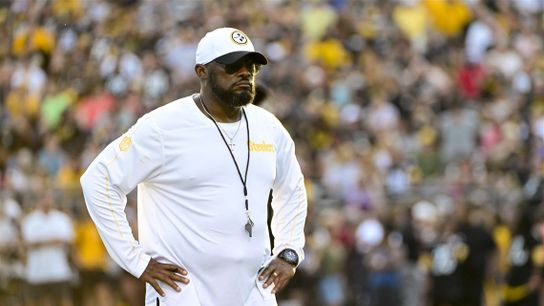The 2024 offseason has positioned the Pittsburgh Steelers into the spotlight. They've made notable moves by acquiring quarterbacks Russell Wilson and Justin Fields, thereby revitalizing their QB room. The addition of Arthur Smith as the new offensive coordinator introduces a fresh approach, promising a potentially more productive offense.

Gene J. Puskar / AP Photo
Steelers' Arthur Smith coaching up Russell Wilson.
The team's management has also pursued strengthening their roster through the NFL Draft and free agency. By selecting offensive linemen Troy Fautanu and Zach Frazier, the Steelers aimed to enhance their protection schemes. Additionally, key free agent signings like linebacker Patrick Queen and safety DeShon Elliott are noteworthy, bolstering their defensive lineup.
These changes create an air of anticipation among fans and analysts. T.J. Watt, a standout defensive performer, continues to be a beacon for the team, having consistently been a top contender for the AP Defensive Player of the Year Award. However, the team's recent past, characterized by a playoff win drought since 2016 and facing the third-hardest schedule in 2024, brings a pressing need for realistic expectations.
Steelers' Tactical Overhaul
Arthur Smith's entry as the offensive coordinator can potentially shift the dynamics of the team's strategy. Smith, known for his methodical and systematic approach while at the Atlanta Falcons, brings expertise that could benefit both veteran and young players. The quarterback competition between Wilson and Fields is a pivotal factor for the team's success. Some experts believe Justin Fields might surpass Wilson during the season due to his dynamic playmaking capability.
In terms of offensive weapons, the receiving corps and the offensive line have undergone improvements, focused on enhancing overall efficiency. The Steelers' drafts of Roman Wilson and Logan Lee indicate a tactical direction aimed at solidifying crucial positions. Additionally, the diverse skill set of rookie Payton Wilson lends flexibility to the defense, potentially making him a strong candidate for Defensive Rookie of the Year.
Yet, the offensive strategy needs tight alignment with the realities of their schedule and opposition. Facing teams like the Dallas Cowboys, Kansas City Chiefs, and Philadelphia Eagles demands a robust and adaptable game plan. Hence, Smith's ability to integrate new quarterbacks seamlessly with existing offensive assets is crucial.
The Evaluation of Defensive Assets
The Steelers' defense has historically been a stalwart component of the team. T.J. Watt remains a key figure, having led the league in sacks multiple times. His performance sets a high standard for the defensive unit. Other young defensive talents, such as Keeanu Benton and Joey Porter Jr., are expected to mature into more prominent roles, contributing significantly to the defense.

Charles LeClaire / USA TODAY Sports
Pittsburgh's defense, T.J. Watt (90), Joey Porter Jr. (24) and Alex Highsmith (56) celebrate.
The addition of free agents Patrick Queen and DeShon Elliott implies a strategy to address areas previously vulnerable. The defense, which ranked lower in key statistical categories like yards per carry allowed and net yards per pass attempt allowed in 2023, could see improvements. Returning to their 2019-2020 defensive form would be beneficial, especially against a challenging schedule.
It's also important to keep an analytical perspective by referencing how betting lines from platforms like HardRock Sportsbook often mirror fan expectations, which may not always translate to actual outcomes. This measured approach is essential when considering the array of factors impacting overall team performance.
Schedule Challenges and Projected Outcomes
A crucial aspect of the Steelers' season will be navigating their schedule. The combination of a late home opener and facing six AFC North games in the final eight weeks sets a strenuous pace. The divisional matchups against the Baltimore Ravens, Cleveland Browns, and Cincinnati Bengals will be particularly telling.
Given the tough second half of the season, predictions on their win-loss record vary. One analysis suggests a 7-9 finish based on the challenging schedule and the current state of the division. Early victories might set a positive tone, but the latter part of the season appears daunting.
The players' preseason performance also factors into these projections. Despite losses in preseason games, certain players like Nick Herbig showcased promising capabilities, suggesting that individual readiness might translate into regular season success.
Leadership and Long-term Potential
Head Coach Mike Tomlin, entering his 18th season with the Steelers, commands respect for maintaining a non-losing record throughout his tenure. His leadership and stability are critical as the team adapts to new dynamics and strategies. Tomlin's track record provides a solid foundation, yet the evolving challenges demand continual adaptability and strategic acumen.
The combination of seasoned leadership and fresh talent offers an intricate blend wherein each component must function cohesively. A significant aspect of this is how effectively Russell Wilson, with his experience, can adapt to the new offensive scheme.
Fan anticipation and media scrutiny will doubtless create a charged atmosphere around the Steelers' campaign. Analysts' mixed opinions on whether the Steelers possess enough offensive firepower to compete in the AFC highlight the uncertainty surrounding their forecasted performance.
Ultimately, while optimism is tempered by realism, the genuine potential within the Steelers' revamped roster and strategic overhaul marks a season of significant interest and close follow. The convergence of seasoned leadership, tactical changes, and youthful prowess awaits a rigorous test against the formidable 2024 schedule.


